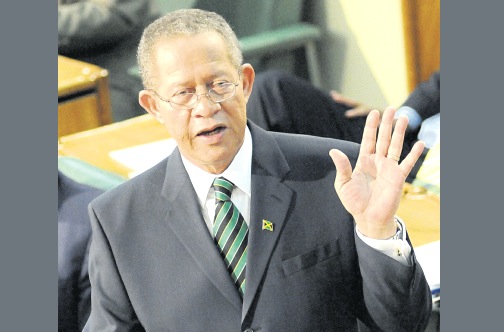SANTA CRUZ, St Elizabeth — The comment by former Prime Minister Bruce Golding hit the funny bone, but for those at a Jamaica Labour Party (JLP) fund-raiser in Black River early this month it also summed up the vagaries of the Jamaican economy.
“Sometimes when I look at the Jamaican economy you get a sense that no matter how much black pepper you put up its nose it won’t sneeze,” said Golding, who resigned as prime minister and leader of the JLP in late 2011.
He was providing a critique of the People’s National Party Government’s economic programme dictated by multilateral lender, International Monetary Fund (IMF) at the function hosted in Black River by Floyd Green, the JLP’s candidate for St Elizabeth South Western.
The former prime minister emphasised that the IMF programme was necessary, and that there were measures being implemented which could not be avoided.
However, for Golding, a matter of great concern was what he termed the “internally contradictory” nature of a programme which insisted on economic growth even while “squeezing the life” out of the economy.
To meet targets, Golding said, the Government had been forced to increase taxes, though Jamaicans were already at their taxable limit, which itself was a disincentive for production.
“The programme essentially is squeezing the economy in order to meet the primary surplus target… In order to get the revenues you need, you squeeze the life out of the economy. Then, if you squeezing the life out of the economy, where is the growth to come from in order for you to achieve targets?” said Golding.
Arguing that the Portia Simpson Miller-led Government had been “hoodwinked”, Golding criticised what he suggested was flawed economic theory promoted by the multilaterals.
“The multilaterals, the IMF, the World Bank, and to a lesser extent the IDB (Inter-American Development Bank) … have this notion, almost like theology to them, that if you get your fiscal house in order, if you reduce your debt, if you cut your expenditure, then you tighten things and you get your budget and fiscal arrangements in good order, ‘listen, nuh man, you gwine be frighten to see how investment and growth tek place’,” said Golding.
But Golding countered that it had been his experience “and the experience of so many countries that I have looked at, which tells me that’s not how it goes”.
He contended that there were countries which could “take off” on the strength of such policies. However, those were blessed with abundant natural resources which allowed them to adjust and adapt.
He cited Ecuador and Colombia in South America as countries with oil and natural gas which made it easier to recover and grow after economic stress.
In the case of Colombia, said Golding, the Government was able to minimise use of natural gas reserves because of abundant rivers providing hydroelectricity to cover most of their energy needs.
Jamaica, on the other hand, was a vulnerable, “open” and “exposed” economy.
“We can’t lock our doors and batten down,” said Golding.
He questioned what he said was a continued low investment climate, despite what were said to be favourable economic indicators which had been commended by the private sector.
“There was a time when the private sector used to say the reason you not seeing investments is because interest rates too high. Interest rates are now down. They used to complain that inflation is too high … out of line with main trading partners… Inflation is down. They use to complain about the high cost of energy (but) oil prices down, some say it may go below US$30 a barrel, (yet) investments are not taking place,” said Golding.
He suggested that the Government should take proactive action to find out what is holding back investors given the favourable indicators.
The Government should set about the task by pulling “together all of its technical agencies”, possibly led by the Planning Institute of Jamaica, the private sector leadership and the multilaterals to do “a serious analysis based on hard data”, Golding said.
He claimed that there “is a lot of investment capital around. Jamaican businesses have acquired a huge
amount of profits over a period of time… some have those profits invested in government paper… some I am told have actually moved it abroad, and wherever it has gone it is probably sitting down on some sort of investment where it’s earning no more than three-quarter or one per cent, and yet nothing so far has been able to induce them to come and invest it in Jamaica. Without that investment we won’t make it.”
He pointed to the downturn in economic activity in town centres and across rural Jamaica as evidence of the effect that the “squeeze” has had, leaving “no money out there to spend”.
The squeeze on the national budget had also brought political representatives under extreme pressure –none more so than MPs for the ruling party — and had forced drastic cutbacks in government services.
A way would have to be found “within the framework of the (economic) programme, but with the clear understanding that the multilaterals are going to have to recognise that the programme is not going to be able to achieve its objectives unless it is calibrated… in such a way that we not only accommodate but can in fact stimulate investment,” said Golding.


